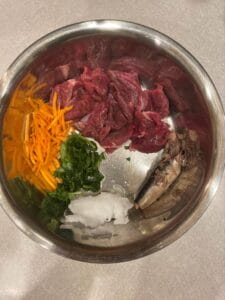In the beginning of life, most dogs are provided with all the nutrients they need through their mother’s milk, in the most concentrated form called colostrum. Dogs, much like their human companions, have dietary needs that evolve over the course of their lives. Puppies, adults, and older dogs each require different balances of essential nutrients to support their health and well-being. Dog nutrition plans include proteins, fats, essential vitamins, and minerals, which play varied roles in a dog’s body, from supporting growth and development to maintaining healthy organ function and energy levels.
These requirements are not uniform across all dogs; breed, size, and a dog’s current health status can all influence their specific nutritional needs. This diversity in nutritional needs shows the necessity for diets that are tailored to the unique requirements of each dog, ensuring they receive the right balance of nutrients at every stage of life (puppy food, adult dog food, senior dog food). Understanding and applying this knowledge is vital for pet owners who are dedicated to optimizing their dog’s health and longevity.
The Importance of Vitamins and Minerals
Vitamins and minerals, though required in relatively small amounts, are indispensable components of a dog’s diet, playing critical roles in various bodily functions. For example, vitamin E helps decrease oxidative damage, vitamin K provides factors necessary for proper red blood cell function, and choline supports liver health. Offering vitamins and minerals through food sources is recommended when possible, but supplements can sometimes be beneficial to fill in any nutritional gaps.
Vitamin A for Adult Maintenance and Supporting Ocular Health
Remember your parents telling you to eat carrots when you were younger? That’s because they contain Vitamin A, which not only helps your body, but can help you have a healthy dog, too. Vitamin A helps maintain normal eye function and health. In addition to maintaining ocular health, it helps support the immune system and cellular health.
B Vitamins in Your Dog’s Food
There are several B vitamins necessary to help keep animals in peak condition including:
Thiamine: Thiamine helps support energy production at a cellular level, supports a normal metabolic rate, and it promotes the activation of ion channels in neural tissue.
Riboflavin, B12, and niacin: Help support enzyme function.
Vitamin B6: Vitamin B6 is especially vital. This vitamin is responsible for many processes including helping support glucose metabolism, supports a healthy red blood cell count, helps maintain normal nervous system function, helps promote normal hormone balance, enhances the immune response, and supports healthy niacin levels.
Pantothenic acid: Supports energy production.
Folic acid: Plays a significant role in supporting amino acid metabolism and in mitochondrial processes.
Vitamin C in Canine Nutrition
Dogs can produce vitamin C naturally in their bodies, but additional vitamin C in their diet can help keep them in peak condition. This water-soluble vitamin provides dogs with antioxidant protection, which is beneficial since antioxidants have been shown to aid in the elimination of unstable oxygen molecules called free radicals.
Vitamin D to Support Pet Health
Vitamin D is the vitamin you get from spending time bathing in the beautiful sunshine. By promoting homeostasis between phosphorus and calcium, it helps build and maintain bones and teeth.
Minerals in Your Dog’s Diet
Minerals, including both macro-minerals and trace minerals, are also crucial to a dog’s overall well-being. Some of the most important minerals in their diet should be:
- Calcium: Helps build and maintain bones and teeth, helps muscle function and fluid balance, and supports normal nerve conduction.
- Phosphorus: Works with calcium to support bone and teeth structure and plays a role in helping support energy production at a cellular level.
- Potassium: Supports normal muscle and nervous systems, supports normal brain and nerve function, and helps maintain normal body fluid levels.
- Magnesium: Supports a normal metabolic rate, supports enzyme function, and supports muscle and nerve function.
- Sodium: Helps maintain normal fluid balance in the blood and tissues and supports normal cardiovascular, immune and neurological function.
- Chloride: Works with sodium to help maintain normal fluid balance in the blood and tissues and supports the production of stomach acid.
- Iron: Crucial for supporting normal red blood cell health and providing enzymes and factors necessary for proper digestion.
- Copper: Important for assisting in the digestion and absorption of essential nutrients, helping build strong bones, and supporting normal muscle and nervous systems. Copper also provides factors for bone development and building of connective tissue.
- Zinc: Supports skin health, supports normal cell function, and supports the immune system, as well as helps support normal thyroid function.
- Manganese: Involved in helping support a supply of energy production at a cellular level, enhances bone and joint health, and supports metabolic functioning of the liver.
- Selenium: Works as an antioxidant, protecting against free radical damage and supporting immune function.
- Iodine: Essential for helping support normal thyroid function, which supports metabolic functioning of the liver.
Incorporating Essential Fatty Acids in Your Dog’s Diet
Fats and essential fatty acids are integral to maintaining a dog’s health, serving several critical functions beyond simply helping support energy production at a cellular level. Omega-3 and Omega-6 fatty acids, in particular, offer a range of health benefits that are crucial for helping maintain the general health of all ages and breeds.
Omega-3 fatty acids, often derived from sources like fish oil or flaxseed, promote normal healthy brain activity and enhance your pet’s brain function, especially in young dogs. They also promote healthy inflammatory pathways which helps maintain joint mobility. Fish oil supplements have been found to promote normal inflammatory pathways and help maintain normal histamine levels.
Omega-6 fatty acids, found in ingredients like poultry fat and safflower oil, are essential for maintaining a shiny coat and healthy skin. A proper balance between omega-3 and omega-6 fatty acids is critical, as it helps maintain the general health of all ages and breeds, from promoting normal healthy brain activity to enhancing the immune system’s response.
Amino Acids From Protein in Your Pet’s Diet
Proteins and amino acids are essential for everyday health and healthy joints, helping maintain proper body composition, supporting the immune system, and supporting a normal metabolic rate. Essential amino acids, those that a dog’s body cannot synthesize on its own, must be supplied through a carefully chosen diet.
The quality and source of protein you feed your dog is critical, as these factors directly influence the bioavailability of these amino acids. High-quality proteins, such as those derived from animal sources like chicken or fish, provide a richer array of amino acids compared to some plant-based proteins. Similarly, grass-fed beef contains higher amounts of linoleic acid than other types. This difference in quality when you feed your dog proteins can significantly impact their health, affecting everything from helping support stamina and endurance to helping support the immune system.
Protein to Support Your Dog’s Body Functions
Proteins are involved in a plethora of bodily functions beyond providing nutritional support for connective tissue. It’s essential for providing enzymes and factors necessary for proper digestion, helping promote normal hormone balance, and helps maintain the general overall health of all ages and breeds. For example, proteins contain ingredients rich in iron and Vitamin B12 which are essential nutrients for hemoglobin formation.
Fiber To Support Complete and Balanced Nutrition
Fiber is a complex carbohydrate that can’t be digested. When most pet parents learn about fiber, it’s often shocking to discover that fiber can both aid in reducing occasional loose stools due to environmental stress or changes in diet, and assists with occasional gastric distress.
Soluble fiber, fiber that can be dissolved in water, helps support blood sugar levels within normal ranges by slowing the absorption of sugar, thereby supporting energy production. It also helps support healthy GI function by supporting the growth of beneficial bacteria in the intestines. Soluble fiber also aids in reducing occasional loose stools due to environmental stress or changes in diet.
On the other hand, insoluble fiber doesn’t dissolve in water and gathers in the intestines which helps support proper digestion and bowel health, which is especially helpful when handling occasional gastric distress. Together, both soluble fiber and insoluble fiber work as a digestive aid to help maintain a healthy intestinal tract.
Check Their Water Source In Addition to Looking At All the Nutrients For Your Dog’s Diet
Water is one of the topics not often covered when discussing dog nutrition, but it’s just as critical to supply healthy drinking water as it is to provide a balanced diet. Water is crucial in promoting intestinal well-being, which assists in the digestion and absorption of essential nutrients.
Water also plays a key part in supporting normal bodily functions, helps support cognitive function, supports normal cardiovascular, immune and neurological function, and helps maintain healthy joints and connective tissue.
AAFCO’s Role in Dog Nutritional Requirements for Young, Senior, and Adult Dogs
The Association of American Feed Control Officials (AAFCO) plays a key role in the pet food industry by establishing guidelines that ensure the nutritional adequacy of dog foods. Products that carry the “complete and balanced” nutrition designation claim to have been formulated to satisfy the nutritional requirements of dogs at various life stages. That’s why you see puppy food, adult food, and senior diets.
AAFCO’s regulations extend beyond nutritional content, as they provide precise recommendations for labeling. This means that all pet food labels should clearly disclose ingredients, nutritional facts, and feeding instructions, providing pet owners with the information necessary to make educated decisions about their dog’s diet.
AAFCO’s influence encourages transparency and accountability among pet food manufacturers. By adhering to these comprehensive guidelines, manufacturers signal their dedication to producing high-quality, nutritionally sound products.
The AAFCO nutritional adequacy statement found on pet food packaging is not only a mark of compliance but also serves as a guide for pet owners in selecting a diet tailored to their dog’s specific nutritional needs. This regulatory framework supports a more informed and discerning consumer base, ultimately elevating the standard of care for dogs across the board.
*Note that Earth Buddy is not in any way affiliated with AAFCO or its regulatory requirements, however, it is important that there is some type of regulatory body when it comes to pet nutrition. Unfortunately, this is not the case in pet supplements and often allows for “wild west” type products that have no regulation or testing requirements.
What is Better for Dog Nutrition, Whole Foods or Processed Foods?
Processed dog foods, including popular options like kibble and canned foods, hold a significant place in the pet food market due to their convenience and accessibility. These foods are engineered to meet the basic nutritional requirements as outlined by organizations like AAFCO, ensuring that dogs will, at minimum, receive their daily nutritional needs.
It’s essential to note that while these foods may cover fundamental dietary necessities, they often lack in providing the whole spectrum of nutrients found in whole foods. High heat processing methods degrade the natural nutrients found in kibble including omega-3, vitamins, minerals, and others.
Despite these nutritional concerns, the appeal of processed dog foods cannot be understated for many pet owners. Their shelf-stable nature, affordability, and ease of use make them a practical choice for busy pet parents. It’s much simpler, and faster, to scoop up a cup of processed, dry dog food than make your own raw or home-cooked diet.
With all that being said, Earth Buddy believes in feeding dogs and cats a whole, fresh food diet is optimal. While convenience and affordability of pet kibble is completely understandable in our economy, the long-term benefits of a species appropriate diet that includes raw or cooked animal protein, raw or cooked vegetables, and minimally processed supplements is best for pet longevity.
There Have Been Some Improvements to Commercial Pet Food, But There Continues to be Concerns
Advancements in pet food technology have led to the development of premium processed options that attempt to bridge the nutritional gap, incorporating higher-quality ingredients in dry food and even fortifying foods with additional vitamins and minerals. But, there is still something alarming in dry food. The presence of additives in dry food, such as artificial colors, flavors, and preservatives like butylated hydroxyanisole (BHA), butylated hydroxytoluene (BHT), and ethoxyquin, remains a contentious issue.
Whole foods for dogs refer to unprocessed, natural ingredients that maintain their nutritional integrity without artificial additives. This diet includes lean meats, vegetables, fruits, and whole grains, offering a well-rounded and nutrient-rich feeding option. There are organizations supporting this trend by delivering custom meal plans made from human-grade ingredients, prepared under strict safety standards, with full transparency.
Whole foods assist in the digestion and absorption of essential nutrients including proteins, fats, vitamins, and minerals, crucial for their overall health and development. Benefits of a whole food diet that incorporates all the nutrients possible through natural sources include a healthier, glossier coat. Whole foods also help maintain a normal inflammatory response, thanks to omega-3 fatty acids, as well as supporting normal digestive function and a healthy gut.
Supplementing for Optimal Dog Nutrition
Supplementing doesn’t mean giving too many treats. Although some supplements may taste like treats to most dogs, they should be carefully chosen to support your dog’s body systems.
The trend of adding supplements to a dog’s diet is on the rise, driven by pet owners’ increasing recognition of the benefits these supplements can provide. Studies indicate that 10–33% of dog and cat owners in the U.S., and up to 84% of horse owners, use supplements to help keep animals in peak condition. This movement towards proactive pet healthcare aims to support physical and mental well-being and provide a complete spectrum of vitamins, minerals, amino acids and fatty acids which complements your pet’s normal diet.
If you’re wanting to provide supplements but aren’t sure where to start, consulting with a board certified veterinary nutritionist that knows the type of dog diets you’re considering may be your next step. They can assess your dog’s overall health status and recommend supplements based on the tests they perform.
The nutritionist may also ask about your dog’s lifestyle to determine how much your dog should eat each day. They may also provide recommendations for a diet that supports weight loss and a healthy appetite to support weight maintenance based on your dog’s body fat measurements, especially for adult dogs.
Adding Fish Oil Versus Fresh Fish for a Balanced Diet
Both fish oil supplements and fresh fatty fish serve as important sources of omega-3 fatty acids, and can support your pet’s mental and physical well-being, but they present distinct advantages and considerations for pet owners in terms of convenience, purity, and rancidity risk. Fish oil supplements offer an easy and efficient method for providing adult dogs with a steady and concentrated intake of omega-3s, without the hassle of meal prep.
These supplements are typically processed to eliminate contaminants such as mercury, common in fresh fish, making them a cleaner option. But fish oil must be stored correctly to avoid rancidity, which can impact their nutritional value. They often contain antioxidants to eliminate free radicals and help reduce oxidative stress.
Fresh fish brings its own set of benefits, including a range of nutrients alongside omega-3 fatty acids, contributing to a dog’s diet in a more natural manner. This still requires proper handling and preparation to ensure it’s safe for dogs to eat, like thorough cooking and removal of bones, and there’s a potential risk of mercury contamination, especially in larger species.
While both options can enhance a dog’s nutritional intake, fish oil supplements are often favored for their convenience and safety, provided they are of high quality and appropriately managed to mitigate the risk of rancidity.
For further reading, we recommend:
- https://www.ncbi.nlm.nih.gov/pmc/articles/PMC7802882/
- https://www.sciencedirect.com/science/article/abs/pii/S0022316623134237
- https://www.ncbi.nlm.nih.gov/pmc/articles/PMC3513714/
- https://www.ncbi.nlm.nih.gov/pmc/articles/PMC5090096/
- https://www.ncbi.nlm.nih.gov/pmc/articles/PMC7111060/
- https://www.frontiersin.org/journals/microbiology/articles/10.3389/fmicb.2021.625562/full
- https://www.ncbi.nlm.nih.gov/pmc/articles/PMC6721126/
- https://www.nature.com/articles/s41586-019-1468-9
- https://www.aafco.org/consumers/understanding-pet-food/ingredient-standards/
- https://www.ncbi.nlm.nih.gov/pmc/articles/PMC4745505/
You Might Also Enjoy
Reactive dog barking may sound intimidating, but it’s important to differentiate it from dog aggression.…
Your dog’s skin is their largest organ making dog skin care a crucial part of…
Like us, our dogs, and other mammalian species, cats have an endocannabinoid system. This system…









